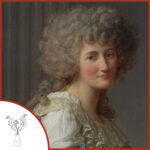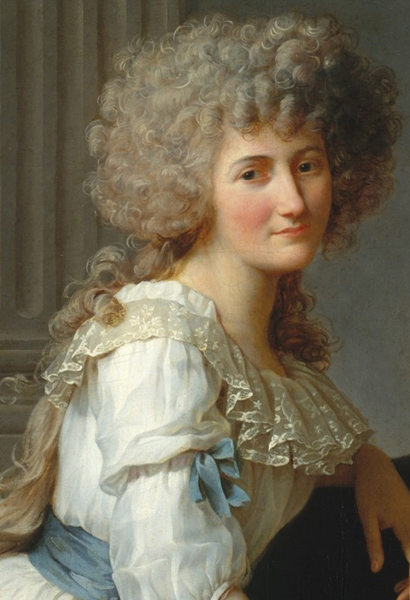

Birth: January 20, 1758
Death: February 10, 1836
Specialty: Chemistry
Major Contributions:
Laboratory Assistant to Antoine Lavoisier
Technical illustrations of chemical experiments
Image Source: Wikimedia Commons
In order to help his daughter, Marie-Anne, escape a marriage proposal from a noble man more than three times her age, her father asked his colleague, a French nobleman, to marry his young daughter instead. The 28 year old Antione Lavoisier agreed to the marriage and a powerhouse scientific partnership began. Marie-Anne Paulz Lavoisier is often considered the mother of modern chemistry, and while the restrictions placed upon women at the time kept her from being considered a proper chemist she was integral to her husband’s work.
Marie-Anne desired to be able to assist Antione in the laboratory and received formal training from her husband’s colleagues to be able to do so and the couple spent most of their time together in their lab. Not only did she keep meticulous records of their experiments, but she also served as editor of Antione’s reports and pushed him to write a proper book on his findings. She trained with a painter in order to properly illustrate the equipment and procedures undertaken in their experimentation, and is the uncredited illustrator of Lavoisier’s Elementary Treatise on Chemistry published in 1789. This work is considered pivotal to modern chemistry as it presented a new naming system for chemical elements and the groundwork for modern chemistry with the idea of the law of conservation of mass.
In order to help her husband keep up with advances in chemistry Marie-Anne learned English and translated the works of many prominent scientists into either French or Latin. One of these was the “’Essay on Phlogiston and the Constitution of Acids” which she not only translated but added her own comments and criticism that convinced her husband that the idea of phlogiston was flawed and led to his studies on combustion and discovery of the element oxygen.
Sadly, the Lavoisiers were caught up in the French Revolution and both Antione and Marie-Anne’s father were beheaded as traitors in 1794. All of the Lavoisiers’ property was seized upon his arrest and it wasn’t until later that he was pardoned and his notes and chemical laboratory equipment were returned to Marie-Anne. After his death Marie-Anne organized the publication of Antoine’s final works as well as works of his colleagues showing the principles of their new chemistry.
Written by Angela Goad
Sources:
Wikipedia: Marie-Anne Paulze Lavoisier
Madame Lavoisier, the translator of oxygen
The Human Touch of Chemistry: Marie-Anne Lavoisier (Archived)
See Also:
Acknowledging Madame Lavoisier (Archived)
